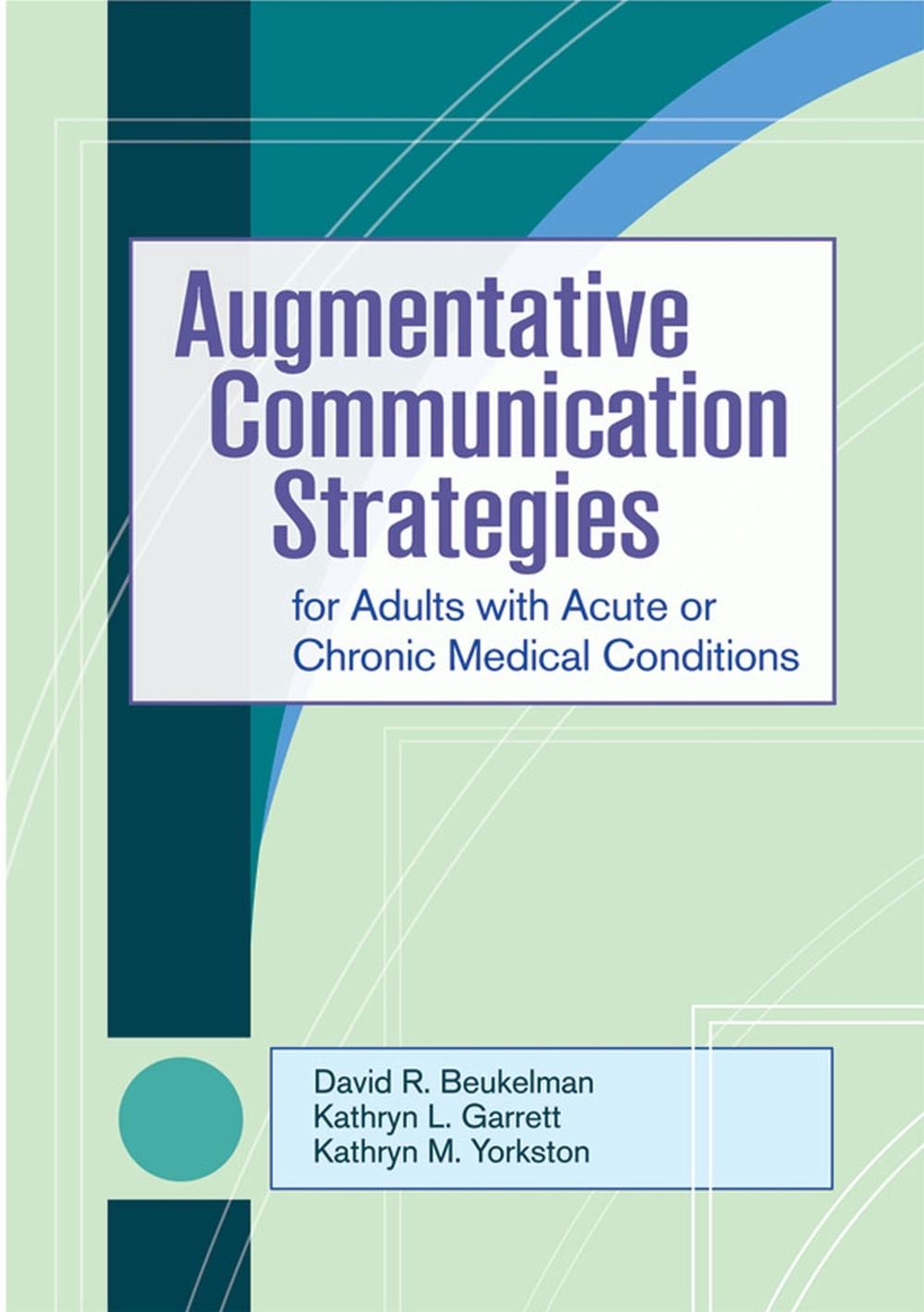
Augmentative Communication Strategies for Adults with Acute or Chronic Medical Conditions
$139.62
- Paperback
448 pages
- Release Date
23 May 2007
Summary
This is a guide to aid clinicians who provide AAC interventions for adults with acquired communication disabilities. Covering a wide range of communication disabilities and disorders caused by injury and illness, the book offers up-to-date AAC intervention strategies and procedures in medical settings. A practical resource for clinicians on AAC intervention in medical settings, this book provides information that is understandable and useful to clinicians who do not specialize in AAC. Chapter…
Book Details
| ISBN-13: | 9781557668752 |
|---|---|
| ISBN-10: | 1557668752 |
| Author: | David R. Beukelman, Kathryn L. Garrett, Kathryn M. Yorkston |
| Publisher: | Brookes Publishing Co |
| Imprint: | Brookes Publishing Co |
| Format: | Paperback |
| Number of Pages: | 448 |
| Release Date: | 23 May 2007 |
| Weight: | 786g |
| Dimensions: | 251mm x 181mm x 22mm |
What They're Saying
Critics Review
“Blends scholarship, available evidence, and clinical insight and experience in reader-friendly ways … a state of the art, clinically-oriented overview with a wealth of practical information.”
“Blends scholarship, available evidence, and clinical insight and experience in reader-friendly ways … a state of the art, clinically-oriented overview with a wealth of practical information.” –Joseph R. Duffy, Ph.D., BC-NCD
About The Author
David R. Beukelman
David R. Beukelman, Ph.D was the Barkley Professor of Communication Disorders at the University of Nebraska-Lincoln, Director of Research and Education of the Communication Disorders Division, Munroe/Meyer Institute of Genetics and Rehabilitation at the University of Nebraska Medical Center, a research partner in the Rehabilitation Engineering and Research Center in Augmentative and Alternative Communication, and a senior researcher in the Institute for Rehabilitation Science and Engineering at the Madonna Rehabilitation Hospital. With Pat Mirenda, he co-authored the textbook, Augmentative and Alternative Communication: Management of Severe Communication Disorders in Children and Adults. He served as editor of the Augmentative and Alternative Communication Journal for four years.
Kathryn L. Garrett, Ph.D., CCC-SLP, is currently a full-time clinician and director of an Augmentative Communication pediatric evaluation center at The Childrenâ ™s Institute in Pittsburgh, PA, where she works with children and young adults who have complex communication needs. She previously had full-time academic appointments at Duquesne University and the University of Nebraska, where she conducted clinical, research, and teaching activities in the areas of aphasia, brain injury, and AAC.
Kathryn M. Yorkston, Ph.D., is Professor and Head of the Division of Speech Pathology in the Department of Rehabilitation Medicine at the University of Washington.
Nancy B. Alarcon, M.S., CCC-SLP, BC-ANCDS, Senior Lecturer and Clinic Director, Department of Speech and Hearing Sciences, University of Washington, 1417 NE 42nd Street, Seattle, Washington 98105
Ms. Alarcon directs the outpatient teaching clinic at the University of Washington and supervises in the area of adult neurologic communication disorders. Her clinical work in this area with colleagues has focused on supported communication intervention in aphasia, the impact of group treatment in reducing social isolation, and long-term patient/family intervention in primary progressive aphasia.
Laura J. Ball, Ph.D., is Director of Hearing and Speech Research at Children’s National Health System and Professor at The George Washington University School of Medicine and Health Sciences in Washington, DC. She completed her doctorate at the University of Nebraska-Lincoln with specialization in motor speech disorders and augmentative and alternative communication. She has more than 35 years’ experience as a clinical speech-language pathologist. Her research addresses AAC and neuromotor speech disorders across the life span. Particular interests are in functional communication and participation, AAC assessment and implementation, and interventions for speech-language impairments resulting from neurologic (i.e., neuromuscular, neurogenetic, neuroimmune, white matter) diseases.
Michelle S. Bourgeois, Ph.D., CCC-SLP, is a professor in the Department of Communication Sciences and Disorders at the University of South Florida and a Fellow of the American Speech Language Hearing Association at Hunter College. A clinical researcher, she investigates interventions designed to improve the quality and quantity of cognitive-communication outcomes for persons with dementia, traumatic brain injury, or aphasia and their spouses and caregivers.
Susan Koch Fager, Ph.D., is the Director of the Communication Center in the Institute for Rehabilitation Science and Engineering. Dr. Fager specializes in assistive technology/augmentative communication for adults with acquired and degenerative neurologic conditions such as traumatic brain injury, spinal cord injury, stroke, amyotrophic lateral sclerosis (ALS), multiple sclerosis, and Parkinson’s disease. Her research has focused on the evaluation of new and emerging assistive technologies for individuals with severe physical impairments.
A speech-language pathologist at work, Melanie wears three hats: Director of the Assistive Technology Program at the Child Development and Rehabilitation Center; Principal Investigator on a University Affiliated Program training grant entitled OTTR (Oregon Technology Training and Resources); and Clinician and Director of the Augmentative Communication Clinic in the Department of Neurology. She has been involved in the field of augmentative and alternative communication since 1979 (when it was still called nonvocal or argumentative communication!). Outside of the office, Melanie wears more than three hats: She is mother of Kiva, Adam, and Corey; partner to Barry; and organizer for all of the hiking, camping, traveling, and adventures that the family takes together.
Joanne P. Lasker, Ph.D., CCC-SLP, has published numerous papers and chapters related to assessment and treatment of adults living with acquired neurogenic disorders who may benefit from AAC. Her research has explored issues pertaining to AAC assessment protocols, context-based intervention, partner training, and the acceptance of AAC approaches by adults with severe communication disorders and their communication partners. She has presented nationally and internationally on these topics.
Returns
This item is eligible for free returns within 30 days of delivery. See our returns policy for further details.




